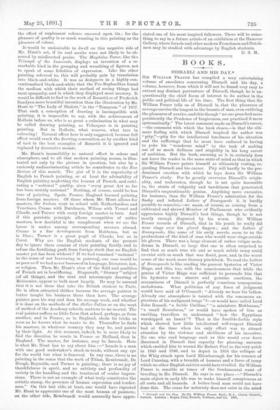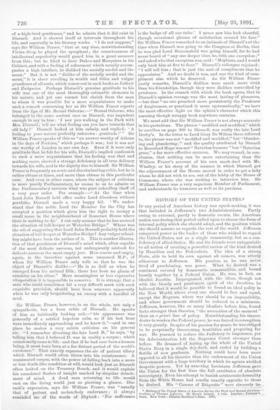BOOKS.
DISRAELI AND HIS DAY.* Sin WILLIAM FRASER has compiled a very entertaining volume of anecdotes concerning Disraeli and his day, a volume, however, from which it will not be found very easy to extract any distinct portraiture of Disraeli, though he is un- questionably the chief focus of interest to its author in the public and political life of his time. The first thing that Sir William Fraser tells us of Disraeli is, that the pleasures of revenge survive the longest in the breasts of men, even outliving the pleasures of avarice, and this though " no one preached more persistently the Prudence of forgiveness, nor practised it more systematically." The latest comment made on Disraeli's career, —the comment with which the book closes,—is that the ulti- mate feeling with which Disraeli inspired the author was " pity,"—pity for the intellectual loneliness of his situation. and the sufferings that he must have endured in having to yoke his "wondrous mind" to the task of making use of so much dullness and stupidity in his long career of ambition. But the book, amusing as it is, certainly does not leave the reader in the same state of mind as that in which Sir William Fraser paints himself as ultimately resting, re- garding Disraeli and his career. Pity will hardly be the pre- dominant emotion with which he lays down Sir William Fraser's study. For he greatly overrates Disraeli's origin- ality, and underrates, though he is not quite insensible to, the strain of vulgarity and tawdriness that penetrated Disraeli's unquestionable genius. Anything more excessive, for instance, than Sir William Fraser's admiration for the flashy and inflated Letters of Runnymede it is hardly possible to conceive,—we mean, of course, as coming from a cultivated and shrewd Member of Parliament who evidently appreciates highly Disraeli's best things, though he is not nearly enough disgusted by his worst. Sir William Fraser records of Disraeli, that in his youth lie really did wear rings over his gloved fingers ; and the Letters of _Runnymede, like some of his early novels, seem to us the productions of the kind of man who would wear rings outside his gloves. There was a large element of rather vulgar melo- drama in Disraeli, so large that one is often surprised to find that so much true wit and so much subtle irony could co-exist with so much that was florid, poor, and in the worst sense of the word, mere literary pinchbeck. To read the Letters of Runnymede is like reading the poorest hysterics of Victor Hugo, and this, too, with the consciousness that while the genius of Victor Hugo was sufficient to persuade him that his hysterics were sincere and genuine emotions, the screaminess of Disraeli is perfectly conscious transpontine melodrama. What politician of any force of judgment would have said of O'Connell : "Already we hear his bellow. Already our atmosphere is tainted with the venomous ex- pirations of his malignant lungs "P—or would have called Lord John Russell, "a feeble Catiline," "a miniature Mokhanna," "a small Searabteus," or would have spoken of him as enabling travellers to understand " how the Egyptians worshipped an Insect "P That is the forcible-feeble style which showed how little intellectual self-respect Disraeli had at the time when his only effort was to attract attention by the violence and shrillness of his invective. No one who read language such as this would ever have discerned in Disraeli that capacity for piercing sarcasm which enabled him to wound Sir Robert Peel to the very quick in 1845 and 1846, and to depict in 1858 the collapse of the Whig attack upon Lord Ellenborough for his censure of Lord Canning, with a breadth of humour and a force of irony which no other English satirist could have rivalled. Sir William Fraser is sensible at times of the fundamental want of breeding in Mr. Disraeli. He says in one place :—" Disraeli's main object in early life was to make himself conspicuous at all costs and all hazards. A better-bred man could not have done this. The craze for notoriety does not exist in the mind Disraeli and his Day. By Sir William Fraser, Bart., Christ Church, Oxford. London : Kogan Paul, Trench, Widmer, and Co. 1891. of a high-bred gentleman," and he admits that it did exist in Disraeli. And it showed itself at intervals throughout his life, and especially in his literary works. "I do not suppose," says Sir William Fraser, "that at any time, notwithstanding Vivian Grey, he played the sycophant ; the consciousness of intellectual superiority would guard him in a great measure from this; but he liked to have Dukes and Marquises in his Cabinet, and with a feeling of refinement which usually accom- panies a high intellect, he disliked the socially sordid and the mean." But it is not " dislike of the socially sordid and the mean," it is sheer revelling in wealth and titles and vulgar grandeurs of all sorts, which comes out in such books as Lothair and Endymion. Perhaps Disraeli's genuine gratitude to his wife was one of the most thoroughly estimable elements in his nature, and yet one cannot but shrink from the man to whom it was possible for a mere acquaintance to make such a remark concerning her as Sir William Fraser reports from the lips of Mr. Bernal Osborne :—" Bernal Osborne, who belonged to the same ancient race as Disraeli, was impudent -enough to say to him : I saw you walking in the Park with Mrs. Disraeli ; tell me what feeling can you have towards that .old lady P' Disraeli looked at him calmly, and replied A feeling to your nature perfectly unknown : gratitude !' " Sir William Fraser speaks of this as "an answer worthy of Athens in the days of Pericles," which perhaps it was ; but it was not one worthy of London in our own day. Even if it were only gratitude that he felt for his wife, Disraeli's implied confession to such a mere acquaintance that his feeling was that and nothing more, showed a strange deficiency in all true delicacy towards his wife, and in the dignity due to himself. Sir William Fraser is frequently an acute and discriminating critic, but he is rather obtuse at times, and more than obtuse in this particular .case. And even in other cases, where the subject of criticism is more purely Parliamentary, he seems to us to admire as fine Parliamentary sarcasm what was pure schoolboy chaff of a very poor order. For example :—" At the time when Lord John Russell held office under Lord Aberdeen without portfolio, Disraeli made a very happy hit. We under- stand that the noble Lord the Member for the City has accepted a position which gives him the right to occupy a small room in the neighbourhood of Somerset House where there is nothing to do.' I can only assume that he has secured the situation of toll-keeper at Waterloo Bridge." Where was the wit of suggesting that Lord John Russell probably held the situation of toll-keeper at Waterloo Bridge? Any vulgar school- boy might have been the author of it. This is another illustra- tion of that patchiness of Disraeli's mind which, often capable of the most delicate sarcasm, not unfrequently mistook for delicate sarcasm the most empty jeer. How coarse and empty, again, is the invective against some unnamed M.P., of whom Sir William Fraser only tells us that he was the object of Disraeli's dislike :—" He is as dull as when he emerged from his natural filth ; there has been no gleam of sunshine on his slime." More meaningless or less expressive vituperation it is impossible to conceive. It is strange that a man who could sometimes hit a very difficult mark with such .exquisite precision, should have been unaware apparently when he was only bespattering an enemy with a handful of mud.
Sir William Fraser, however, is on the whole, not only a sympathetic, but a keen critic of Disraeli. He speaks of him as habitually looking sad,—" his appearance was generally of a settled hopeless calm as if his last hour were immediately approaching and he knew it,"—and in one place he makes a very subtle criticism on his general air. "I remember diverting the late Lord B.," he says, "by telling him that I believed D. was in reality a corpse ; which occasionally came to life : and that if he had ever been a human being, it must have been at a far distant period of the world's existence." That exactly expresses the air of patient idiocy which Disraeli would often throw into his countenance. A reanimated corpse, with the power of falling back into a more or less death-like condition at will, would look just as Disraeli often looked on the Treasury Bench, and it would explain his occasional flashes of insight marked by singular detach- ment of mind. A dead man returning to life would cast on the living world just so piercing a glance. Dis- raeli's expression, says Sir William Fraser, was " usually that of patient and melancholy endurance ; it always reminded me of the words of Shylook : For sufferance is the badge of all our tribe.' I never saw him look cheerful, though occasional gleams of satisfaction crossed his face." Sir William Fraser remarked to an intimate of Disraeli's at the time when Disraeli was going to the Congress at Berlin, that he was glad Lord Beaconsfield was going himself, for he had never heard of " any one deeper than he, with one exception ;" and asked who that exception was, said : "Mephisto, and I would only back him at five to four." Disraeli's colleague rejoined : "I will tell him ; that is just the sort of compliment that he appreciates." And no doubt it was, and was the kind of com- pliment also which he deserved. As Sir William Fraser justly remarks, Disraeli's dislikes were much more vivid than his friendships, though they were dislikes controlled by prudence. In the remark with which the book opens, that in Disraeli's opinion revenge was the most lasting of pleasures, —but that "no one preached more persistently the Prudence of forgiveness, or practised it more systematically," we have the most effective light on the sphinx's character which this amusing though scrappy book anywhere contains.
We must add that Sir William Fraser is not always accurate in his quotations. The phrase " meddled and muddled," which he ascribes on page 209 to Disraeli, was really the late Lord Derby's. In the letter to Lord Gray De Wilton there referred to, the phrase was not " meddled and muddled," but " blunder- ing and plundering ; " and the quality attributed by Disraeli to Beresford Hope was not " Batavian humour " but " Batavian grace," a far more effective sarcasm. We may remark, in con- clusion, that nothing can be more entertaining than Sir William Fraser's account of his own mock-duel with Mr. Whalley, or his story of the manner in which Disraeli got the adjournment of the House moved in order to get a lady whom he did not wish to see, out of the lobby of the House of Commons, where she was waiting to interview him. Sir William Fraser was a very sagacious Member of Parliament, and understands its humours as well as its passions.



































 Previous page
Previous page